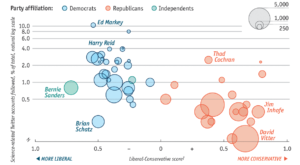A progress update by the Bank of England describes the Bank’s intention, over time, to extend direct access to RTGS to non-bank Payment Service Providers (firms granted the status of E-Money Institutions or Payment Institutions in the UK), collectively known as PSPs. By extending RTGS access, our objective is to increase competition and innovation in the market for payment services.
Read More »Micro Aggression and Political Correctness
In the NZZ, Andrea Köhler qualifies the micro aggression debate on US college campuses as a “witch hunt.” Um keine Missverständnisse aufkommen zu lassen: Der allgemeine Konsens, Diskriminierung zu ahnden, ist hier nicht gemeint. Selbstverständlich gilt es, traumatisierte Menschen zu unterstützen und Minoritäten zu schützen; letzteres hat das Attentat von Orlando einmal mehr deutlich gemacht. Doch die Hypersensibilität an den Universitäten unterminiert jede Form des intellektuellen...
Read More »McMillan’s “The End of Banking”
Jonathan McMillan proposes a systemic solvency rule which stipulates that [t]he value of the real assets of a company has to be greater than or equal to the value of the company’s liabilities in the worst financial state. (p. 147) That is, the financial assets of a company have to be financed by equity. This reminds of Kotlikoff’s limited purpose banking, see here and here. McMillan (who is actually two persons, a banker and a journalist) argues that Kotlikoff’s proposal is a step in the...
Read More »OMT Does Not Manifestly Exceed ECB Competences
The German Federal Constitutional Court has decided that the policy decision on the OMT program does not “manifestly” exceed the competences attributed to the European Central Bank: If the conditions formulated by the Court of Justice of the European Union in its judgment of 16 June 2015 (C-62/14) and intended to limit the scope of the OMT programme are met, the complainants’ rights under Art. 38 sec. 1 sentence 1, Art. 20 secs. 1 and 2 in conjunction with Art. 79 sec. 3 of the Basic Law...
Read More »US Labor Market and Monetary Policy
In a blog post, Stephen Williamson argues that the US labor market is doing just fine. Given recent productivity growth, and the prospects for employment growth, output growth is going to be low. I’ll say 1.0%-2.0%. And that’s if nothing extraordinary happens. Though we can expect poor performance – low output and employment growth – relative to post-WWII time series for the United States, there is nothing currently in sight that represents an inefficiency that monetary policy could...
Read More »GRIM Test
The Economist reports about a simple test of the plausibility of published research, and that many well published psychology papers failed it.
Read More »CAD-Coin
In the FT, Philip Stafford reports about a digital currency initiative by the Bank of Canada and commercial banks. It will involve issuing, transferring and settling central bank assets on a distributed ledger via a token named CAD-Coin. But: The Bank of Canada said the experiment was a proof-of-concept and confined to interbank payment systems. … “None of our experiments are to develop central-bank issued e-money for use by the general public.”
Read More »Science and the Senate
The Economist’s Graphic Detail reports about research documenting that While the Senate’s interest in science is generally quite low, Senate Democrats are three times more likely than Republicans to follow science-related Twitter accounts like NASA or the National Oceanic and Atmospheric Administration. Interest in science, the authors conclude, “may now primarily be a ‘Democrat’ value”.
Read More »Covered Interest Parity and the Risk-Taking Channel
In a speech, Hyun Song Shin points out that CIP increasingly fails to hold: the Dollar interest rate implied by FX swaps vis-a-vis the Euro, Yen, Pound or Swiss Franc is “too high.” Moreover, the deviation is negatively correlated with the Dollar’s spot exchange rate: When the Dollar appreciates, the deviation from CIP widens. Shin argues that bank behavior explains the deviation: … the US dollar is used widely throughout the global banking system, even when neither the lender nor the...
Read More »Iceland on the Way Back to an Open Capital Account
In the NZZ, Rudolf Hermann reports about Iceland’s recent steps towards removing capital controls. The article also reviews the financial crisis in Iceland. See also a previous post on capital account liberalization in Iceland and another one on the legal dispute between Iceland and the UK and the Netherlands.
Read More » Swiss Economicblogs.org
Swiss Economicblogs.org

